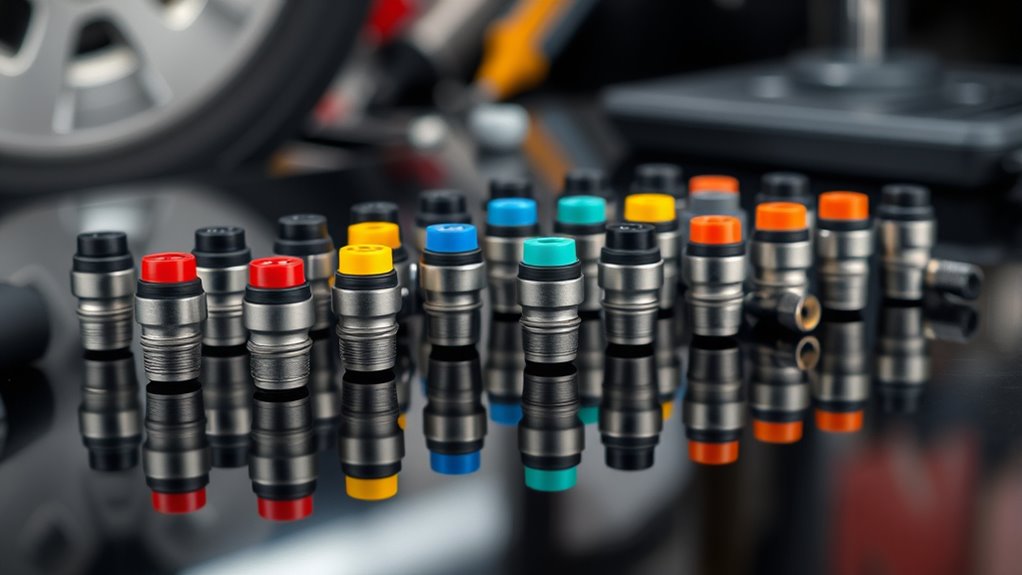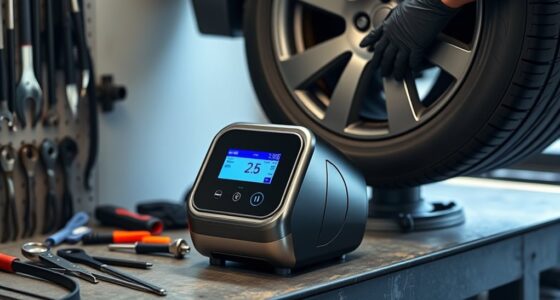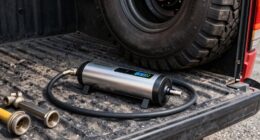When looking for the best TPMS sensors to guarantee safety and accuracy, I recommend choosing options that fit your vehicle, have durable batteries, and are easy to install or program. Brands like GM, A-Premium, Tymate, and VXDAS offer reliable, long-lasting sensors with good compatibility and support. I’ve listed some top choices, but you’ll find more details if you keep exploring—getting the right sensors means safer, more accurate tire monitoring for your vehicle.
Key Takeaways
- Choose sensors compatible with your vehicle’s make, model, year, and OEM part numbers to ensure proper fitment and functionality.
- Opt for dual-frequency (315MHz + 433MHz) sensors with durable construction and long-lasting batteries for consistent safety and accuracy.
- Verify if sensors are pre-programmed or require programming with compatible tools like OBDII scanners for quick, hassle-free installation.
- Prioritize sensors with positive customer reviews, warranties, and support to ensure reliability and quick resolution of potential issues.
- Ensure sensors meet SAE J2657 standards for safety, accuracy, and compliance, providing reliable tire pressure and temperature monitoring.
TPMS Sensor GM 4-Pack Replacement for Chevy GMC Cadillac Buick
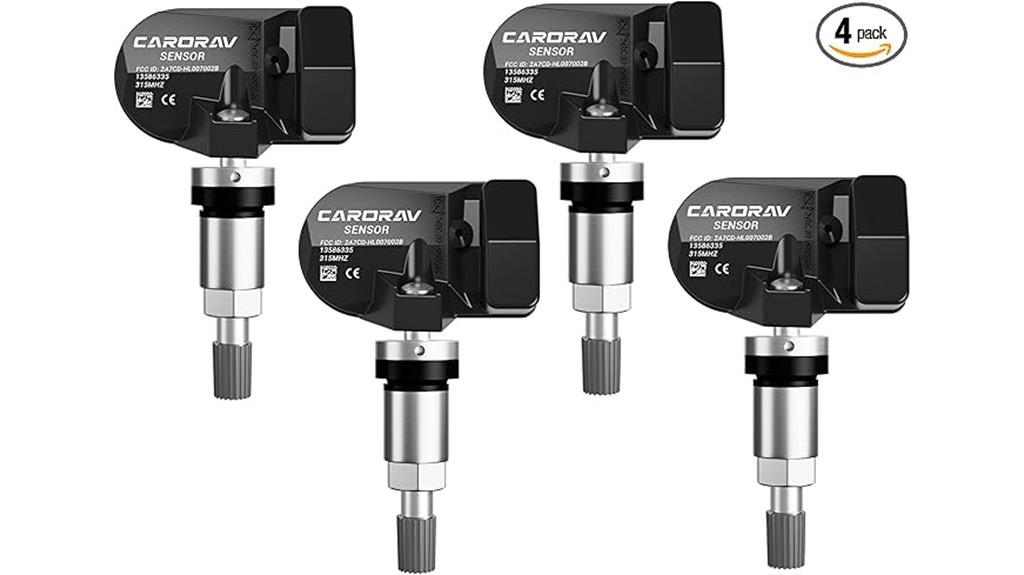
If you own a GM vehicle like a Chevy, GMC, Cadillac, or Buick, the CARORAV TPMS Sensor 4-Pack is a great choice for replacing your tire pressure sensors. These sensors are designed for compatibility with most GM models, including popular vehicles like the Silverado, Yukon, Enclave, and Malibu. They’re OE-replacement, pre-programmed, and easy to install, with batteries included. The sensors provide accurate, real-time tire pressure data, helping improve safety and prevent warning lights. With a durable design and a lifespan over five years, they’re a reliable, cost-effective solution for maintaining excellent tire performance.
Best For: GM vehicle owners seeking affordable, reliable TPMS sensors that are easy to install and maintain optimal tire pressure.
Pros:
- OE-replacement and pre-programmed for quick, hassle-free installation
- Compatible with a wide range of GM models including Chevy, GMC, Cadillac, and Buick
- Durable with a lifespan exceeding 5 years and real-time pressure monitoring
Cons:
- Some units may experience slow communication or occasional sleep mode issues
- Compatibility issues can occur if sensors are purchased from unreliable sources
- Requires basic tools or OBDII scanner for relearn process, which may be challenging for some users
Marsflex TPMS Sensors (4 Pack) for Toyota Lexus Vehicles
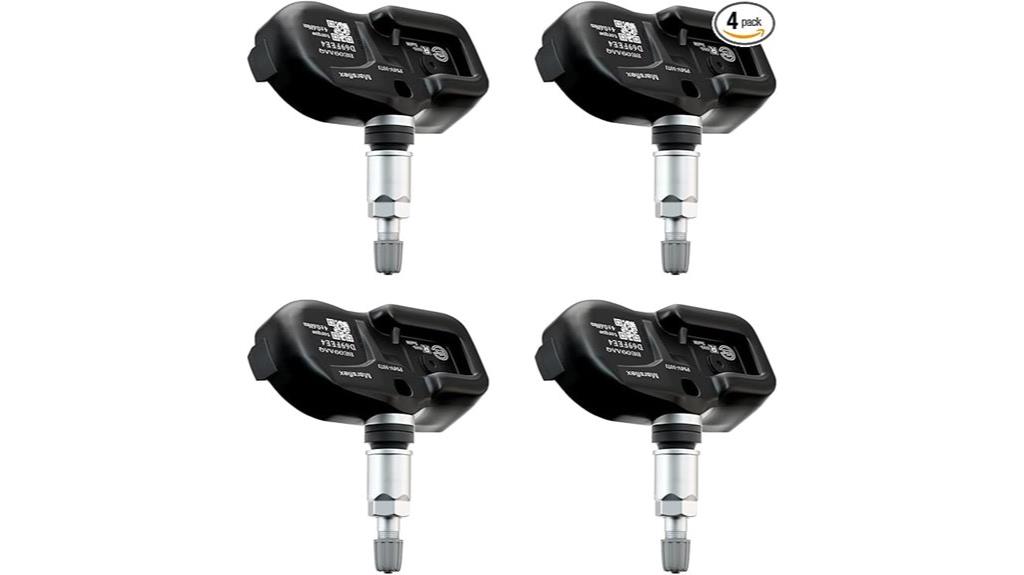
For Toyota and Lexus vehicle owners seeking a reliable, cost-effective solution to maintain proper tire pressure monitoring, Marsflex TPMS Sensors (4 Pack) offer an excellent choice. These sensors are compatible with a wide range of models, including RAV4, Camry, Lexus RX, and LS, supporting tire pressures from 30 to 35 psi at 315MHz. They feature upgraded batteries lasting 5-8 years, durable construction, and strong signal strength for real-time monitoring. Easy to install and program with compatible tools, many users find they perform like OEM parts. With a 4.2-star rating and a one-year warranty, Marsflex sensors combine quality, affordability, and dependable performance.
Best For: Toyota and Lexus vehicle owners seeking cost-effective, reliable TPMS sensors compatible with a wide range of models for real-time tire pressure monitoring.
Pros:
- Cost-effective alternative to OEM sensors with comparable performance
- Easy to install and program using compatible diagnostic tools
- Durable construction with a lifespan of 5-8 years and strong signal strength
Cons:
- Some users report the plastic valve feel compared to OEM’s metal valves
- Programming may require specific tools and knowledge of sensor ID inputs
- Compatibility checks are essential to avoid fitment issues, and incorrect part matching could occur
Tymate TM7 Tire Pressure Monitoring System
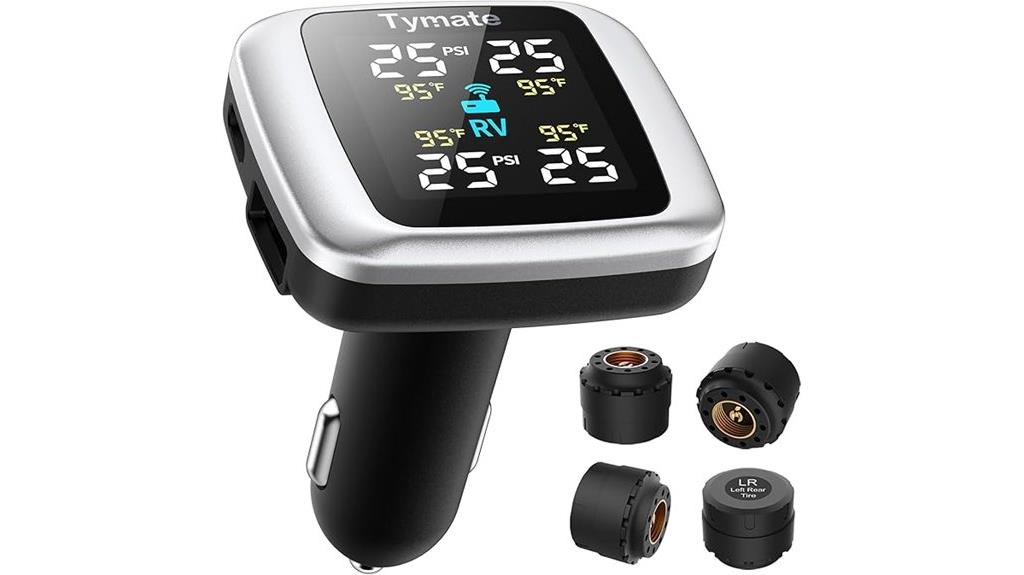
Looking for a reliable TPMS that’s easy to install and perfect for a variety of vehicles? The Tymate TM7 offers wireless monitoring with four external sensors, compatible with RVs, SUVs, trucks, sedans, and trailers. It provides real-time pressure and temperature data, with automatic calibration for different vehicle types. The colorful LCD display is easy to read, and installation is simple—just plug into your cigarette lighter, with no complex wiring. It features multiple alarms for high/low pressure, leaks, and high temperature, plus dual USB ports for charging. Customers praise its accuracy, quick setup, and peace of mind, making it an excellent choice for safety-conscious drivers.
Best For: safety-conscious drivers, DIY enthusiasts, and commercial operators seeking reliable, easy-to-install tire monitoring across various vehicle types.
Pros:
- Easy plug-and-play installation via cigarette lighter with no complex wiring
- Accurate real-time pressure and temperature monitoring with automatic calibration
- Multi-alert system for high/low pressure, leaks, and high temperature
Cons:
- Minor temperature discrepancies reported by some users
- Limited to 4 external sensors, which may not suit larger fleets or vehicles with many tires
- Display visibility could be affected in very bright sunlight despite adjustable backlight
TPMS Tire Pressure Monitoring Sensor for GM Vehicles (4 Pack)
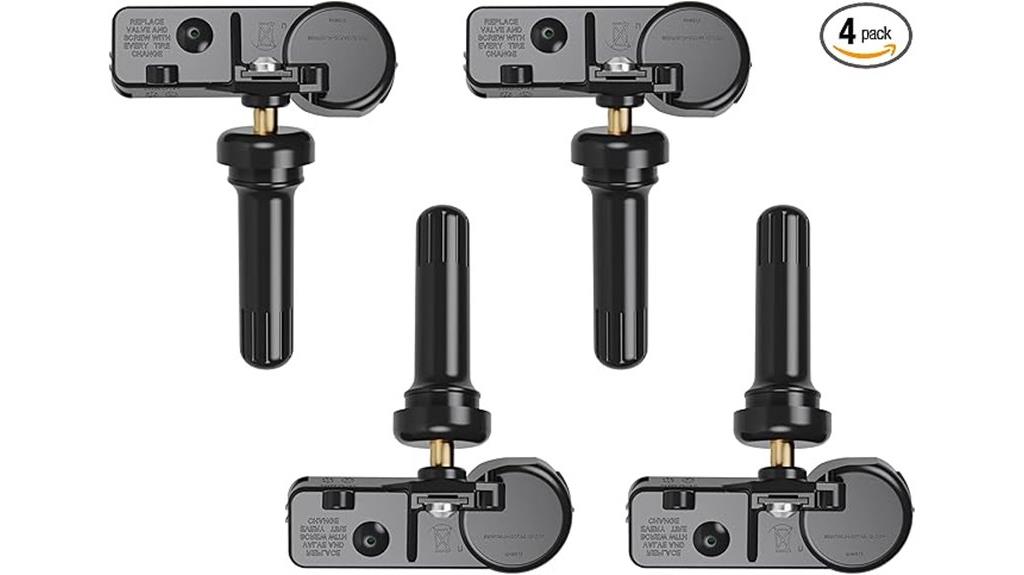
These TPMS Tire Pressure Monitoring Sensors are an excellent choice for GM vehicle owners seeking reliable, long-lasting replacements. Designed to fit Chevrolet, GMC, Cadillac, Buick, Pontiac, Saturn, Hummer, and Saab models manufactured after 2006, they ensure accurate tire pressure readings. These sensors are built with high-quality, OE-like parts, offering durability and safety, with batteries lasting up to 10 years. They’re pre-programmed and easy to install—no programming needed—just activate with a scan tool. Replacing your original sensors, they help maintain ideal tire pressure, enhancing safety, performance, and system reliability. A cost-effective solution for long-term, dependable tire monitoring.
Best For: Vehicle owners with GM models manufactured after 2006 seeking reliable, long-lasting, and easy-to-install tire pressure monitoring solutions.
Pros:
- Compatible with a wide range of GM vehicles including Chevrolet, GMC, Cadillac, and more
- No programming required—pre-programmed sensors for quick activation with a scan tool
- Durable design with batteries lasting up to 10 years and temperature resistance up to 125°C
Cons:
- Only compatible with GM vehicles manufactured after 2006
- Requires a scan tool for activation, which may not be readily available to all users
- Sensors are designed for specific makes and models, limiting universal application
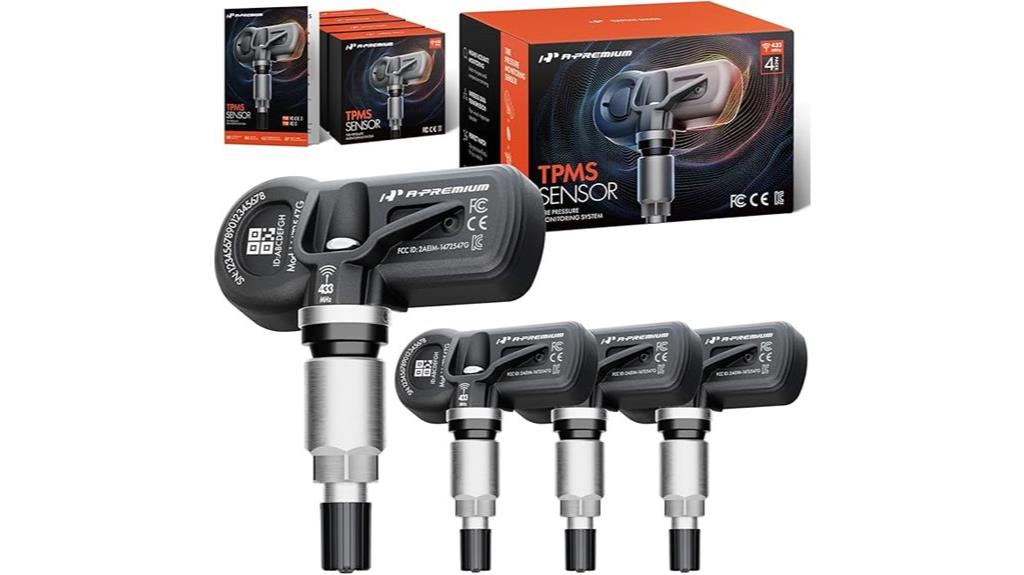
If you’re seeking an easy, cost-effective way to upgrade your Chevy, GMC, Cadillac, or Buick vehicle’s tire pressure monitoring system, the A-Premium 4PCS Pre-Programmed TPMS Sensors are an excellent choice. These sensors fit a wide range of models, including Chevrolet Silverado, Suburban, Tahoe, GMC Sierra, Cadillac Escalade, and Buick Enclave, operating at 433MHz for broad compatibility. They’re pre-programmed, so no coding is needed, and installation is straightforward. Made from durable aluminum and polyamide with high-precision chips, they provide accurate readings, quick response times, and reliable performance. At around $40 for four, they offer a budget-friendly, OEM-like solution with a 2-year warranty.
Best For: vehicle owners seeking a cost-effective, easy-to-install TPMS solution for Chevrolet, GMC, Cadillac, and Buick models that require no coding or professional assistance.
Pros:
- Pre-programmed sensors that require no coding, making installation quick and simple
- Durable construction with aluminum and polyamide, ensuring long-lasting performance
- Affordable price point (~$40 for four sensors) offers significant savings over OEM options
Cons:
- Some users report variability in sensor longevity and potential early failure
- Relearning sensors may require additional tools or professional help for OBD procedures
- Limited information on sensor lifespan under extreme temperature conditions
TPMS Sensor Dodge 4 Pack 433MHz

The TPMS Sensor Dodge 4 Pack 433MHz is an excellent choice for vehicle owners seeking a straightforward, reliable replacement for their tire pressure monitoring system. These sensors are compatible with Dodge, Jeep, Ram, Chrysler, and Fiat models, with verified fitment to prevent issues. They come pre-programmed, so no additional setup is needed—simply install and drive. Built with durable CR2032 batteries that last up to 10 years, they withstand extreme temperatures and provide accurate readings. Many users report quick, hassle-free installation, with the TPMS light turning off within minutes. Overall, these sensors offer reliable performance and great value, backed by a one-year warranty.
Best For: vehicle owners seeking an easy-to-install, reliable TPMS replacement compatible with Dodge, Jeep, Ram, Chrysler, and Fiat models.
Pros:
- Pre-programmed sensors that require no additional setup, ensuring quick and hassle-free installation.
- Durable CR2032 batteries with a lifespan of up to 10 years, suitable for extreme temperatures.
- Compatible with a wide range of vehicles, verified for specific models to prevent fitting issues.
Cons:
- Some users have experienced sensors not reading immediately or needing additional calibration.
- Potential compatibility issues if vehicle models are not verified before purchase.
- Occasional reports of sensors failing or delayed recognition, highlighting the importance of proper installation and verification.
Marsflex TPMS Sensor Set of 4 for Toyota Lexus Scion Pontiac
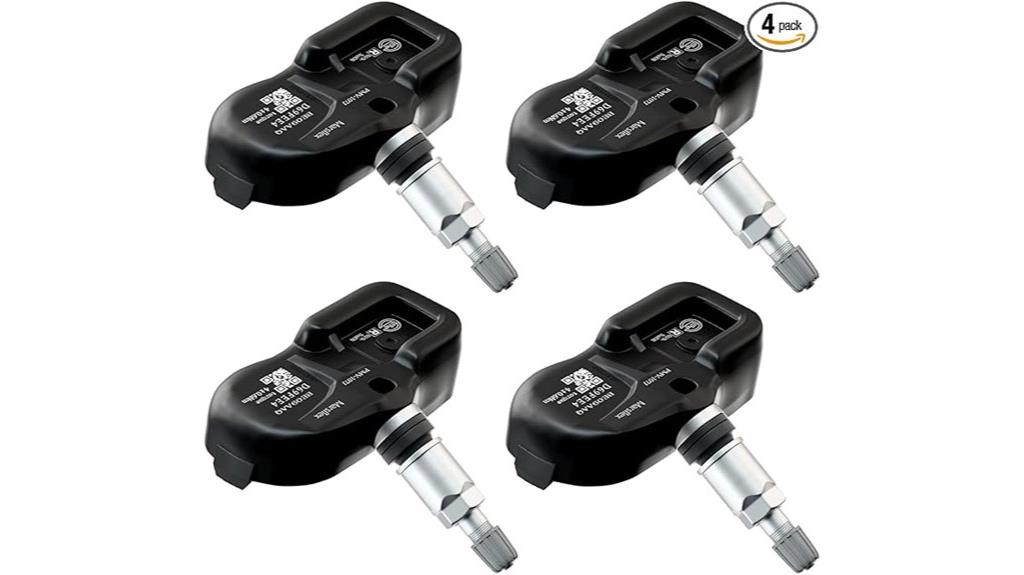
For vehicle owners seeking an affordable, reliable solution to maintain accurate tire pressure monitoring, the Marsflex TPMS Sensor Set of 4 is an excellent choice. These pre-programmed sensors are compatible with various Toyota, Lexus, Scion, and Pontiac models from 2003-2017, replacing OE part numbers like 42607-33011 and PMV-107J. Made from alloy steel and ABS, they measure tire pressure within 15-65 psi with high accuracy. Batteries last up to 8 years, and installation is straightforward with proper programming using TPMS tools. Customers report reliable performance, cost savings, and easy setup, making these sensors a smart alternative to OEM options.
Best For: vehicle owners with Toyota, Lexus, Scion, or Pontiac models from 2003-2017 seeking a cost-effective, reliable TPMS solution that is easy to install and maintain.
Pros:
- Compatible with a wide range of Toyota, Lexus, Scion, and Pontiac vehicles, ensuring versatility.
- Cost-effective alternative to OEM sensors with reliable performance and up to 8 years of battery life.
- Easy to program and install with common TPMS tools, making DIY maintenance feasible.
Cons:
- Some users have reported receiving sensors that appeared used or missing valve stems.
- Initial pairing or reprogramming may require multiple attempts or specific procedures.
- Compatibility verification is essential before purchase to avoid fitment issues.
A-Premium 4PCS TPMS Tire Pressure Monitoring Sensors for Ford and Lincoln
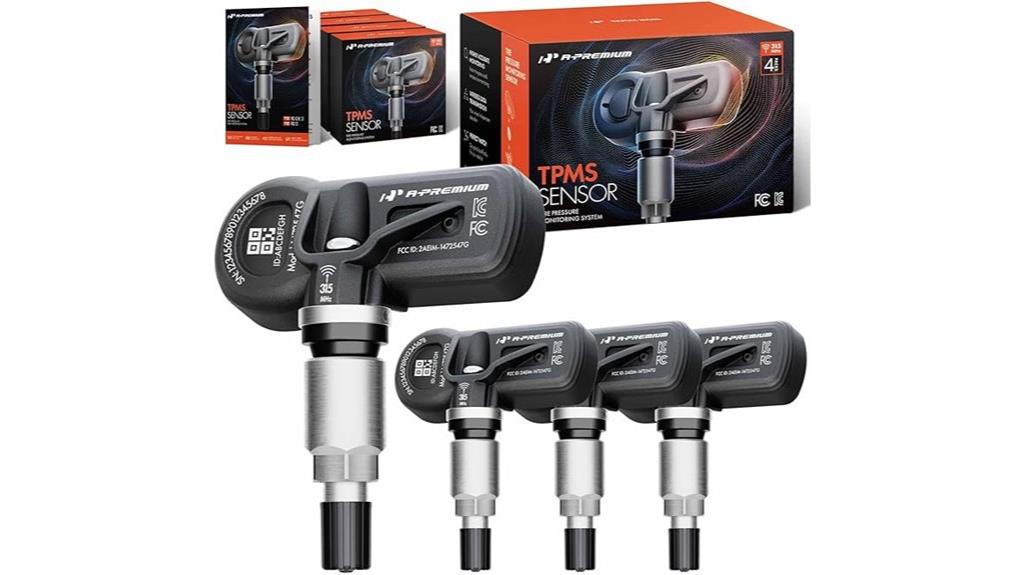
Designed for Ford and Lincoln owners seeking reliable tire pressure monitoring, the A-Premium 4PCS TPMS Sensors offer a seamless, pre-programmed solution that requires no coding. These sensors are compatible with numerous Ford models like the F-150, Mustang, Explorer, and more, as well as Lincoln vehicles including Navigator and MKZ. Fully certified and tested to SAE J2657 standards, they feature high-precision NXP chips, durable batteries, and upgraded aluminum valves. Easy to install with step-by-step instructions, they provide accurate, stable readings across extreme temperatures, enhancing safety and driving confidence. Plus, with a 2-year guarantee, you can trust their long-lasting performance.
Best For: Ford and Lincoln vehicle owners seeking easy, reliable tire pressure monitoring solutions without the need for complex coding or professional assistance.
Pros:
- Fully pre-programmed and ready to install, no coding required.
- Compatible with a wide range of Ford and Lincoln models for versatile use.
- Features high-precision NXP chips and durable components for accurate and long-lasting performance.
Cons:
- Installation may require professional help for OBD relearn procedures.
- Compatibility limited to specified Ford and Lincoln models; not universal.
- Replacement batteries and valves might need periodic maintenance or replacement over time.
TPMS Sensor for GM Chevy Silverado Buick Cadillac GMC Pontiac (4 Pack)
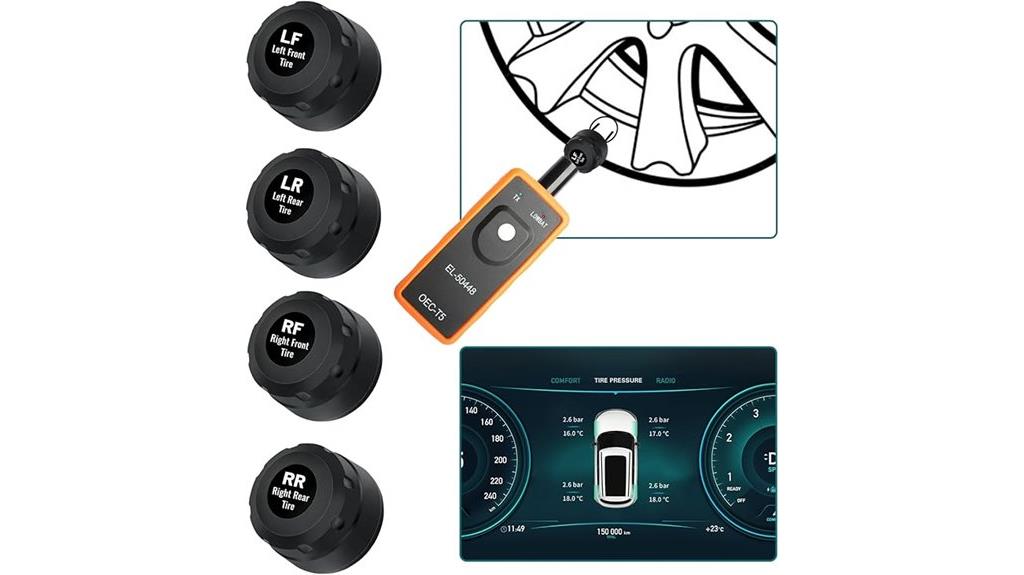
If you own a GM vehicle like a Chevy Silverado, Buick, Cadillac, GMC, or Pontiac manufactured after 2006, these TPMS sensors are a smart choice. The Masoll 4-pack offers easy DIY installation, screwing onto your tire valves and replacing traditional caps. Compatible with many GM models, they feature high measurement accuracy (±0.5psi) and respond within 5 seconds. The set includes batteries, a relearn tool, and durable, corrosion-resistant sensors. Users praise their affordability, simple setup, and reliable performance, with readings close to inflators. Overall, these sensors provide a cost-effective, convenient solution for maintaining ideal tire pressure and safety.
Best For: GM vehicle owners seeking an affordable, easy-to-install TPMS sensor replacement to maintain tire pressure monitoring without professional assistance.
Pros:
- Simple DIY installation with screw-on design and included relearn tool
- Cost-effective alternative to OEM sensors, saving money
- Accurate readings within ±0.5psi and quick response time of 5 seconds
Cons:
- Slight protrusion of sensors may require additional balancing adjustments
- Some users experience minor delays when airing tires without gauges
- Batteries have an estimated 2-year lifespan, requiring replacement over time
Autel TPMS Sensors (MX Sensor, MaxiTPMS)
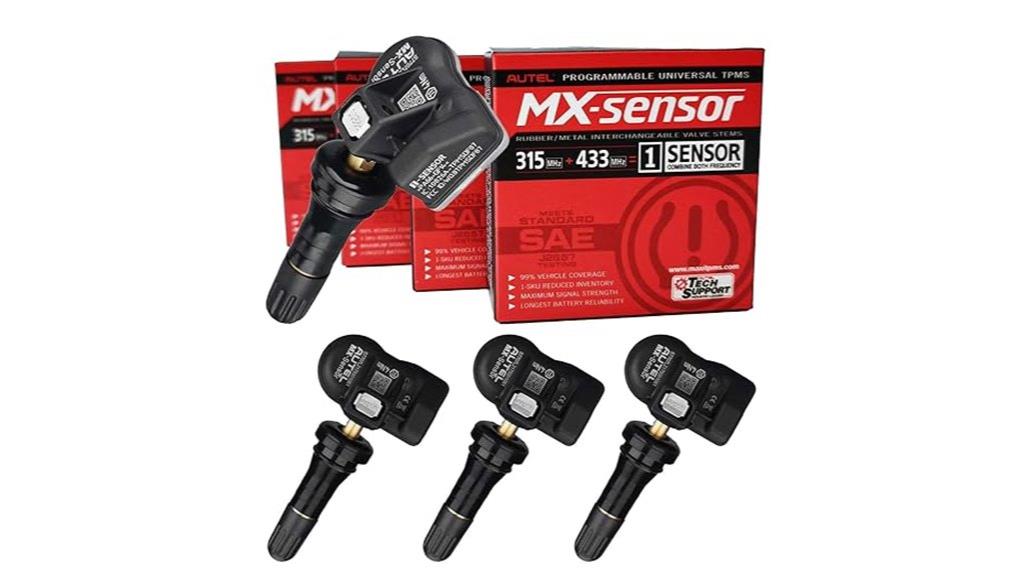
Autel TPMS Sensors, like the MX Sensor and MaxiTPMS, stand out as the ideal choice for shops and DIY enthusiasts seeking broad vehicle compatibility and easy installation. These sensors feature a dual-frequency design (315MHz + 433MHz), making them compatible with a wide range of vehicles, including Subaru, Toyota, and Ford, with some exceptions. Their press-in design simplifies replacement, and wireless programming allows batch processing with Autel tools, saving time. They’re clone-able to avoid relearn procedures and meet SAE standards for quality and durability. Weighing just 11g, they offer reliable performance and long battery life, making them a smart, cost-effective solution for TPMS needs.
Best For: DIY enthusiasts and repair shops seeking easy-to-install, broad-vehicle compatibility TPMS sensors with reliable wireless programming.
Pros:
- Dual-frequency design (315MHz + 433MHz) ensures compatibility with a wide range of vehicles.
- Wireless batch programming with Autel tools simplifies installation and saves time.
- Clone-able sensors eliminate the need for relearn procedures, streamlining replacement.
Cons:
- Some vehicle models, such as 2018 Audi Q7, use ABS control instead of sensors, limiting compatibility.
- Shops may be hesitant to install customer-supplied sensors without proper tools or procedures.
- Limited availability of installation support in certain regions could delay setup or troubleshooting.
CDWTPS 4-Pack GM TPMS Sensors for Chevrolet and GMC
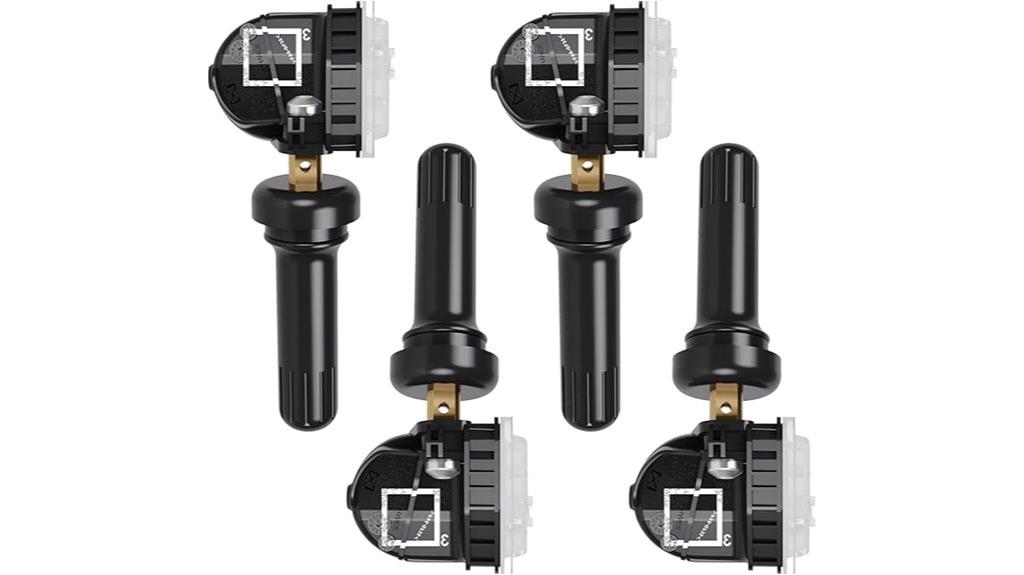
The CDWTPS 4-Pack GM TPMS Sensors are an excellent choice for vehicle owners seeking a reliable, cost-effective solution to monitor tire pressure on Chevrolet and GMC trucks and SUVs from 2007 to 2012. These sensors are compatible with models like Silverado, Avalanche, Equinox, and more, replacing OE parts such as 13598772 and 20923680. They come pre-programmed, so no additional setup is needed—just activation. With high-performance CR2032 batteries lasting up to 10 years and a 900kPa chip for accurate readings, they offer dependable monitoring. Customers praise their ease of installation, affordability, and consistent performance, making them a smart upgrade for your vehicle.
Best For: vehicle owners with Chevrolet or GMC trucks and SUVs from 2007-2012 seeking an easy, affordable TPMS sensor replacement solution.
Pros:
- Pre-programmed sensors requiring no additional setup, just activation
- Long-lasting CR2032 batteries with up to 10 years of service
- Cost-effective alternative to shop prices, with positive user reviews for compatibility and ease of installation
Cons:
- May not be compatible with all vehicle models; verification required before purchase
- Some users reported sensors failing after installation or activation issues
- Limited to specific GM models and years, not suitable for all vehicles
Marsflex TPMS Sensor 4PCS for Toyota, Lexus, Subaru
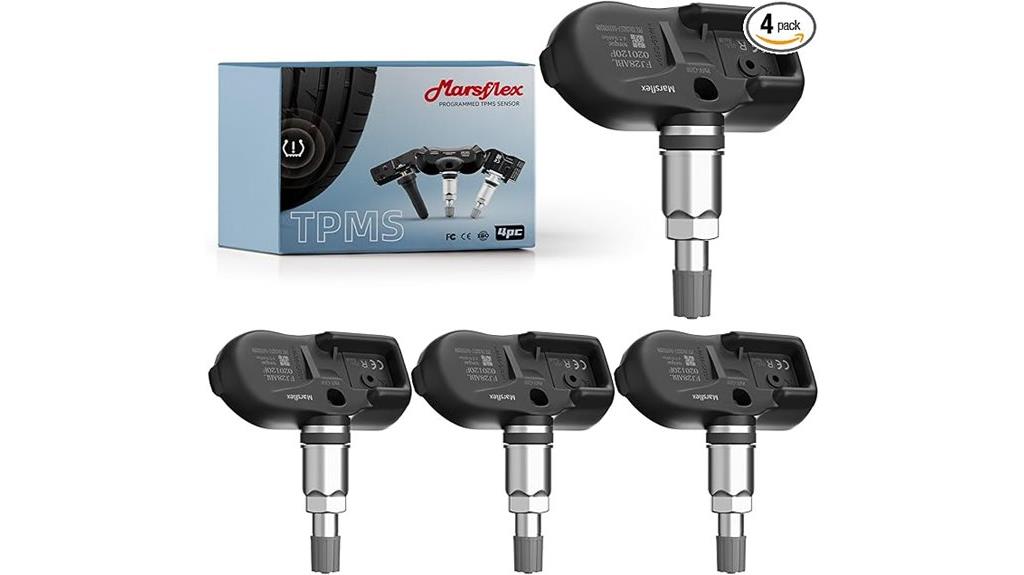
Designed for Toyota, Lexus, and Subaru owners, the Marsflex TPMS Sensor 4PCS set offers a reliable and easy-to-install solution for maintaining ideal tire pressure. These sensors are compatible with a wide range of models, including Camry, RAV4, Corolla, Highlander, Prius, Avalon, LS460, GS, IS, NX, RC, and Yaris, from 2012 onward. They come pre-programmed and only need activation with a scan tool like XTool TP150 or Techstream. Built from durable materials, each sensor features a long-lasting battery, strong signal strength, and precise pressure measurement. Customers praise their ease of installation, effectiveness, and affordability, making them a top choice for Toyota, Lexus, and Subaru owners.
Best For: Toyota, Lexus, and Subaru owners seeking an affordable, reliable, and easy-to-install TPMS sensor replacement for maintaining optimal tire pressure.
Pros:
- Easy installation with pre-programmed sensors requiring only activation via scan tool
- Wide compatibility with numerous Toyota, Lexus, and Subaru models from 2012 onward
- Durable construction with long-lasting battery life (5-8 years) and strong signal strength
Cons:
- Requires a scan tool for activation and programming post-installation
- Sensors are made of plastic, which may be less durable in extreme conditions
- Limited to specific vehicle makes and models, not suitable for non-compatible brands
6-Wheel RV Tire Pressure Monitoring System (TPMS)
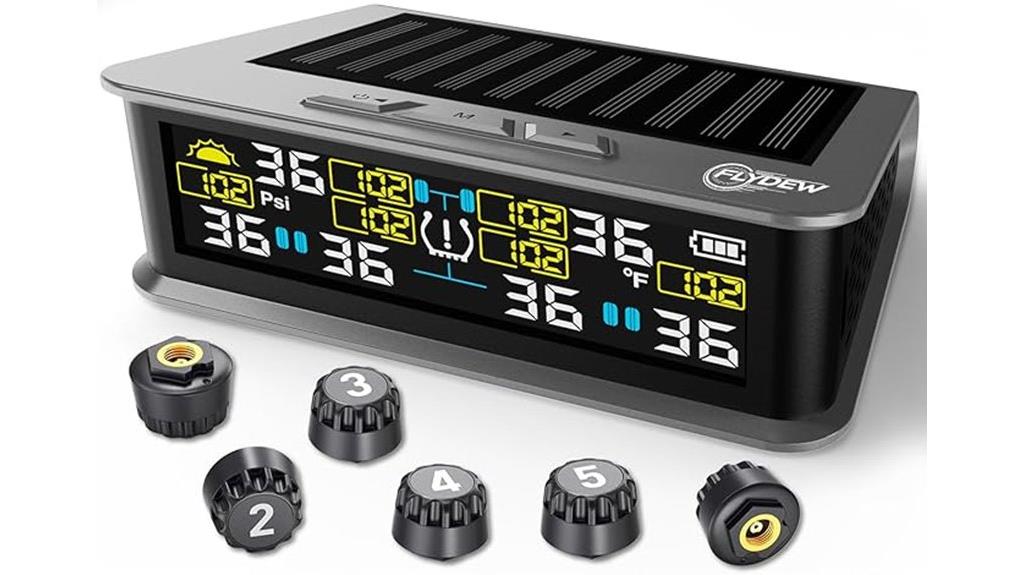
If you’re looking for a tire pressure monitoring system that offers professional-grade accuracy and real-time updates, this TPMS is an excellent choice for RV owners and heavy-duty vehicle operators. It provides 24/7 monitoring with ±1.5 PSI precision across 0-144 PSI, updating every 0.3 seconds—three times faster than standard systems. The LCD display refreshes every 6 seconds and delivers clear alerts for leaks, pressure drops, or temperature spikes. With six customizable alarm modes, sealed sensors, and no battery replacements needed, it guarantees reliable performance in all weather conditions. Its easy installation and support for multiple vehicles make it a practical, safety-enhancing investment.
Best For: RV owners, heavy-duty truckers, and trailer operators seeking professional-grade, real-time tire monitoring for enhanced safety and efficiency.
Pros:
- High-precision monitoring with ±1.5 PSI accuracy and rapid 0.3-second updates for all six tires
- Durable, sealed sensors with no battery replacements needed, suitable for all weather conditions
- User-friendly installation with clear instructions, customizable alarm modes, and support for multiple vehicle types
Cons:
- Requires initial setup of sensors and calibration, which may be challenging for some users
- The LCD display refresh rate of 6 seconds might not be ideal for real-time tracking of rapid leaks
- Additional sensors and accessories may increase overall cost for extensive vehicle setups
Autel TPMS Sensors Set of 4
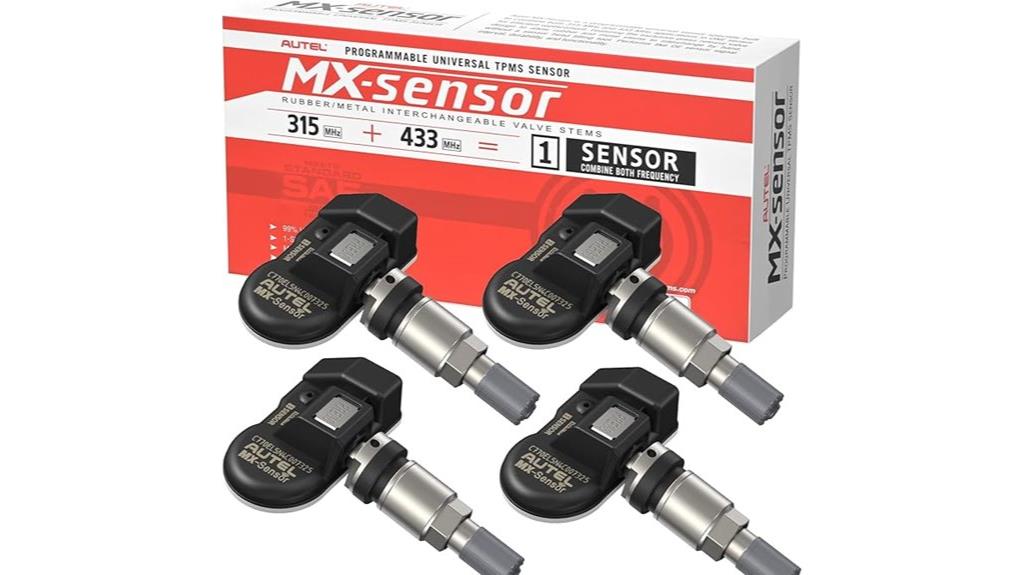
Looking to replace your vehicle’s tire pressure sensors quickly and affordably? The Autel TPMS Sensors Set of 4 offers a versatile, cost-effective solution compatible with over 150 vehicle brands, including Ford, BMW, VW, and more. These press-in, programmable sensors feature dual-frequency technology (315MHz + 433MHz) with an automotive-grade battery lasting over five years. Easy to install with interchangeable valve stems, they simplify the replacement process. Designed for broad compatibility and durability, users report quick programming and reliable performance. With excellent customer reviews and a 24-month warranty, this set ensures your safety without breaking the bank.
Best For: vehicle owners seeking a reliable, cost-effective, and easy-to-install TPMS sensor replacement compatible with a wide range of car brands and models.
Pros:
- Broad compatibility with over 150 vehicle brands and models, including Ford, BMW, VW, and more.
- Easy press-in installation with interchangeable valve stems, saving time and effort.
- Durable, automotive-grade battery lasting over five years with dual-frequency (315MHz + 433MHz) technology for reliable performance.
Cons:
- Some users may experience initial programming challenges requiring updates or reprogramming.
- Variability in battery life (78–94%) depending on usage and conditions.
- Occasional reports of physical defects such as loose bodies or missing components, which may require support or replacement.
VXDAS TPMS Relearn Tool for GM Tire Sensor
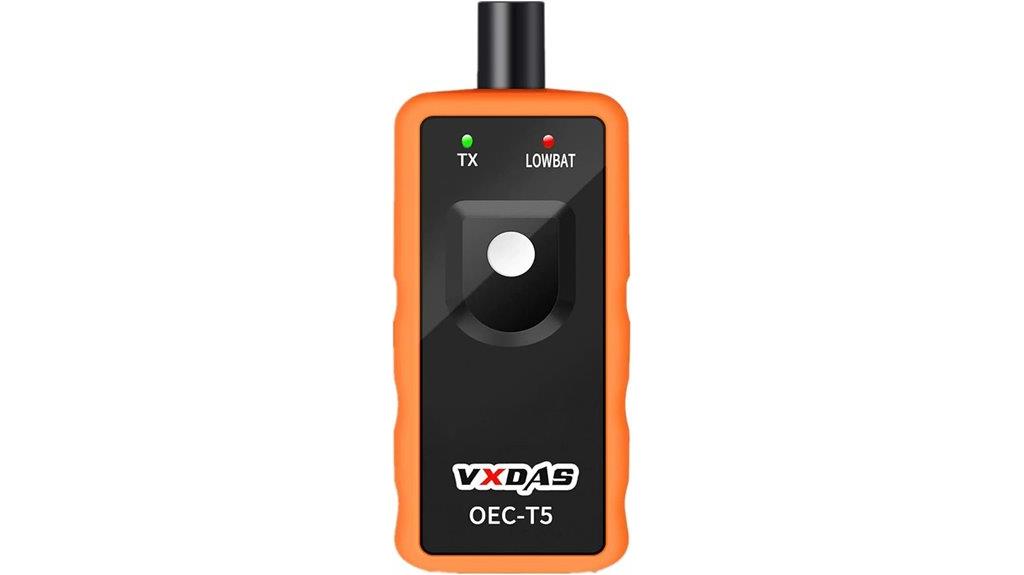
The VXDAS TPMS Relearn Tool for GM Tire Sensors stands out as an ideal solution for DIY enthusiasts and vehicle owners who want quick, cost-effective tire sensor reprogramming. It’s compatible with GM models from 2006-2023, including Chevy, Buick, GMC, and Cadillac, using 315/433 MHz sensors. The device activates sensors within 1-2 minutes, saving trips to dealerships. It’s easy to use—just put the vehicle in TPMS mode, hold the tool near the valve stem, and press the button. Its durable design and sensitive chips ensure reliable, accurate resets, making it a smart, budget-friendly choice for maintaining proper tire pressure and safety.
Best For: DIY vehicle owners and tire enthusiasts seeking a quick, affordable solution for reprogramming GM tire sensors from 2006 to 2023.
Pros:
- Fast activation and reset of tire sensors within 1-2 minutes, saving time and trips to the dealership.
- Easy to operate with minimal steps, suitable for users without technical experience.
- Cost-effective alternative to professional services, saving up to $80.
Cons:
- Not compatible with heavy trucks having more than 4 tires or external TPMS systems.
- May require additional steps or manual entering into learning mode for certain GM truck models.
- Sensor health is critical; dead or damaged sensors will not respond, limiting effectiveness.
Factors to Consider When Choosing TPMS Sensors
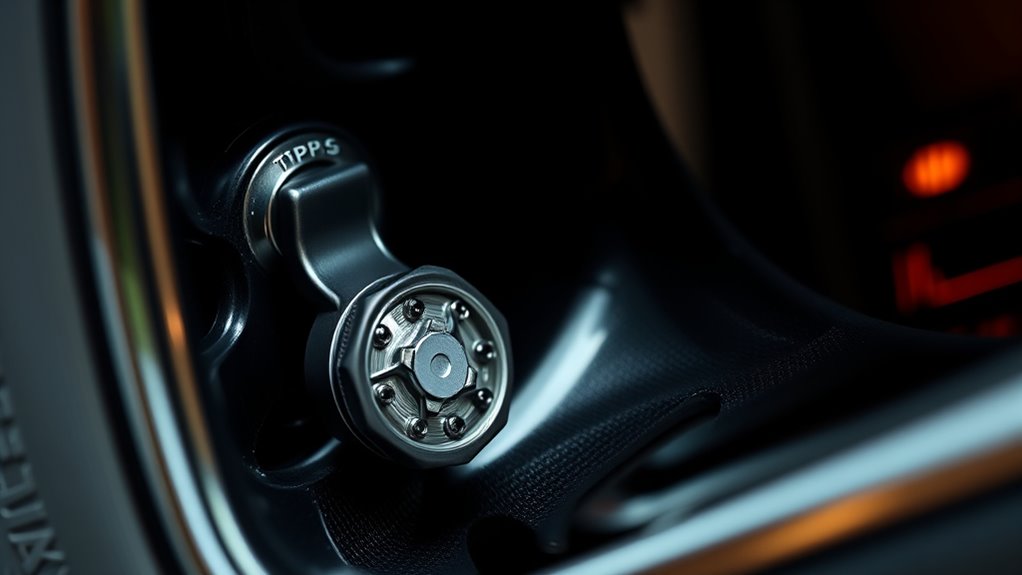
When choosing TPMS sensors, I always start by checking if they’re compatible with my vehicle. I also consider the sensor’s frequency type and how easy it is to install, along with battery life and programming needs. These factors help make certain I get a reliable, long-lasting sensor that fits my car perfectly.
Compatibility With Vehicle
Choosing the right TPMS sensor for your vehicle requires careful attention to compatibility factors that can affect system performance. First, make sure the sensor’s part number matches your vehicle’s original OEM part number for your specific model and year. It’s also essential to verify that the sensor’s frequency, whether 315MHz or 433MHz, aligns with your vehicle’s system specifications. Compatibility with your vehicle’s make, like GM, Toyota, or Ford, and your particular model or series, is critical. Additionally, check that the sensor’s installation type—pre-programmed, clamp-in, or screw-on—fits your valve stem design. Finally, consult manufacturer compatibility guides and fitment lists to avoid mismatched sensors that could cause system errors or malfunction.
Sensor Frequency Type
Have you ever wondered why some TPMS sensors work seamlessly with your vehicle while others don’t? It’s all about the sensor’s frequency type. Most sensors operate at either 315MHz or 433MHz, and these need to match your vehicle’s system for proper communication. Some sensors are dual-frequency, compatible with both, offering more flexibility across different models. The frequency determines how the sensor communicates with your car’s ECU, which affects whether you need to reprogram or relearn the system. Using a sensor with the wrong frequency can cause it to fail in detecting tire pressure or trigger warning lights unnecessarily. Ensuring the sensor’s frequency matches your vehicle’s system is vital for reliable, accurate tire pressure data and overall safety.
Ease of Installation
Selecting the right TPMS sensor can considerably impact installation ease, especially if you want to save time and avoid complications. Pre-programmed sensors that don’t require coding can be installed in minutes, making setup quick and straightforward. Sensors with a plug-and-play design, like press-in or screw-on types, eliminate the need for specialized tools or technical skills. Compatibility verification before purchase is vital—it ensures the sensor fits your vehicle’s make, model, and year, reducing guesswork and installation errors. Additionally, sensors with simple activation procedures, such as using a scan tool or pressing a button, streamline the process further. Clear, step-by-step instructions or manuals also help ensure proper installation, minimizing mistakes and making the whole experience hassle-free.
Battery Life Span
Battery life span is a crucial factor when considering TPMS sensors, as most are designed to last between 5 and 10 years. The actual lifespan depends on usage and environmental factors like extreme temperatures and tire pressure fluctuations, which can speed up battery depletion. High-quality OEM and aftermarket sensors typically offer at least five years of reliable operation. Some sensors include replaceable batteries, allowing for extended use without replacing the entire unit, which can be cost-effective and convenient. Monitoring the battery health is essential; neglecting it can lead to sensor failure and inaccurate pressure readings, compromising safety. When choosing a TPMS sensor, consider models with longer battery life or replaceable batteries to ensure consistent, dependable performance over time.
Programming Requirements
When choosing TPMS sensors, understanding their programming requirements is essential to guarantee proper system operation. Some sensors come pre-programmed and require no extra steps, making installation straightforward. Others need to be programmed using specialized scan tools or relearn procedures to sync with your vehicle’s ECU. Compatibility plays a key role—certain sensors are compatible with your system and are easy to activate, while others demand complex programming. Some sensors are reprogrammable or cloneable, reducing replacement costs. Incorrect or incomplete programming can cause warning lights, malfunctions, or inaccurate pressure readings, so following proper procedures is imperative. Whether you’re installing new sensors or reprogramming existing ones, knowing these requirements ensures your TPMS functions accurately and reliably.
Price and Warranty
Considering the cost and warranty options can help you choose the right TPMS sensors that fit your budget and provide lasting performance. I recommend checking the warranty period—longer warranties, like two years, give you more confidence in the sensor’s durability and support. Price varies widely: budget sensors are usually $25-$40 for a set of four, while OEM or premium options can be over $60. Be sure to verify if the price includes batteries and installation accessories, as some budget sensors come ready to install and save you extra costs. Also, look for guarantees or return policies, like Amazon’s 30-day return or manufacturer warranties, to protect against defects. Balancing cost with warranty coverage ensures you get reliable, long-lasting sensors.
Frequently Asked Questions
How Do I Know if a TPMS Sensor Is Compatible With My Vehicle?
When I want to know if a TPMS sensor is compatible with my vehicle, I start by checking my vehicle’s make, model, and year. I also look at the sensor’s specifications, like valve stem type and frequency. I always consult my owner’s manual or contact the manufacturer to verify compatibility. This way, I avoid buying the wrong sensor and keep my vehicle safe and running smoothly.
What Is the Typical Lifespan of a TPMS Sensor Before Replacement?
The typical lifespan of a TPMS sensor tends to tick around five to ten years, depending on factors like driving habits and environmental exposure. I’ve found that regular maintenance and mindful monitoring can maximize sensor longevity. If your sensor signals a warning or shows inconsistent readings, it’s probably time to replace. Staying proactive helps guarantee your safety and keeps your vehicle’s readings dependable, so don’t ignore those tire pressure alerts!
Can TPMS Sensors Be Installed or Replaced by DIY Enthusiasts?
I believe DIY enthusiasts can install or replace TPMS sensors, but it’s not always straightforward. You’ll need the right tools, like a tire pressure gauge, a relearn tool, and some technical know-how. If you’re comfortable with vehicle maintenance and follow manufacturer instructions carefully, you can do it. However, I’d recommend professional help if you’re unsure, to guarantee proper installation and avoid damaging your sensors or tires.
How Do Different Frequency Options (E.G., 433MHZ vs. 315MHZ) Affect Sensor Compatibility?
Imagine trying to fit a puzzle piece only to find it’s the wrong shape—that’s what mismatched frequency options like 433MHz and 315MHz feel like. These frequencies affect sensor compatibility directly; sensors must match your vehicle’s receiver. Using the wrong frequency means the sensor won’t communicate properly, risking inaccurate readings. Always double-check your vehicle’s specifications before choosing a sensor, ensuring seamless compatibility and reliable performance.
What Are the Signs That My TPMS Sensor Needs Recalibration or Replacement?
When I notice my TPMS sensor needs recalibration or replacement, I look for warning signs like warning lights on the dashboard, inconsistent tire pressure readings, or if the tire pressure seems off compared to the recommended levels. Sometimes, I also notice rapid fluctuations in readings or if a tire has recently been repaired or replaced. If these occur, I know it’s time to recalibrate or replace the sensor to keep my vehicle safe.
Conclusion
After exploring these top TPMS sensors, I believe that choosing the right one can genuinely improve your safety and driving accuracy. It’s tempting to think all sensors are the same, but the truth is, quality matters—just like with anything else. A reliable sensor not only keeps your tires in check but also prevents costly repairs down the road. Trust me, investing in a good TPMS is a theory worth proving for safer, smarter driving.
